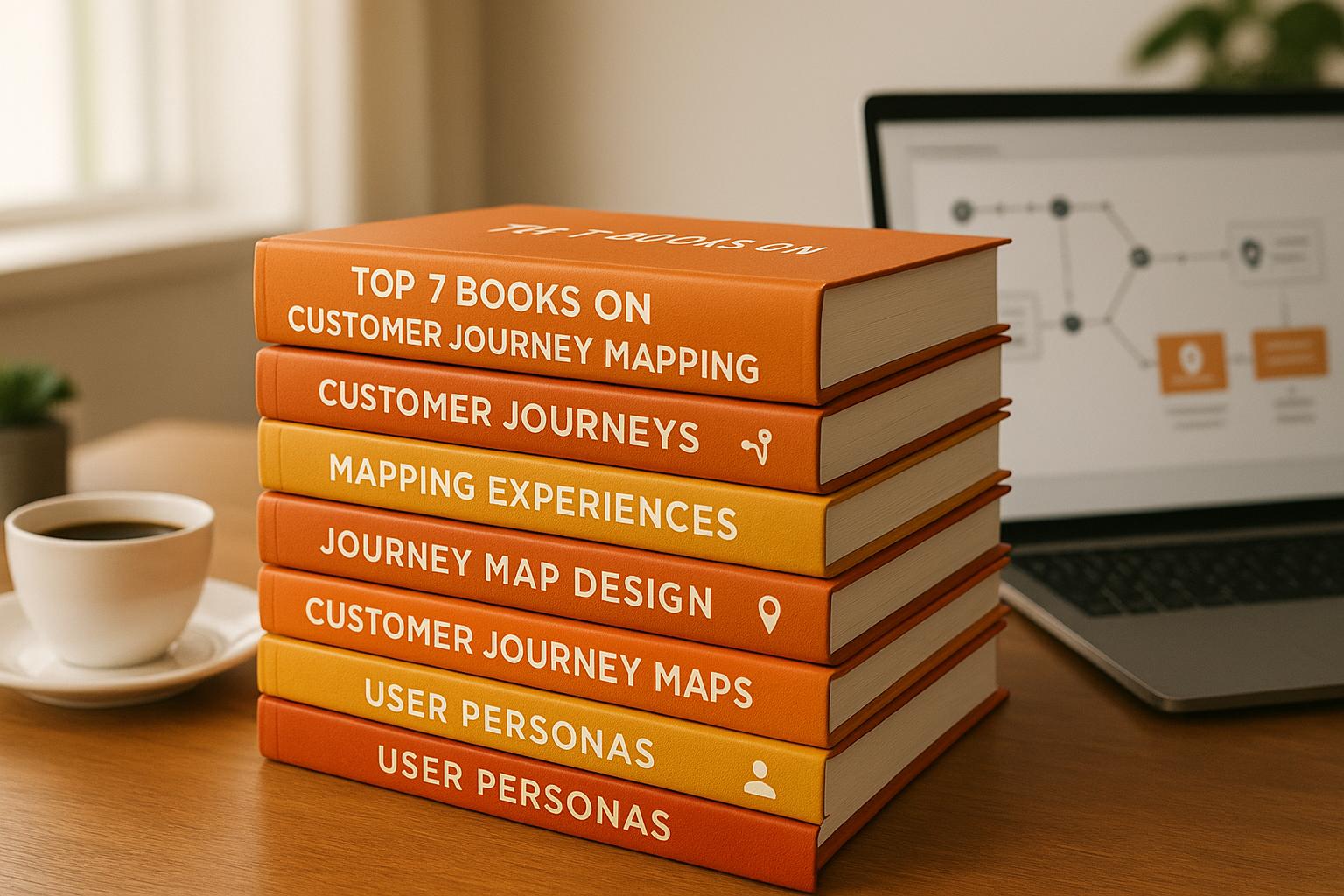Want to find business books that stay relevant no matter the trends? Focus on books rooted in timeless principles, backed by strong research, and written by credible authors. These books often shape industries, influence business education, and provide solutions that adapt to evolving challenges.
Key Takeaways:
- Timeless Principles: Look for books addressing universal business challenges like leadership, strategy, and innovation.
- Author Credibility: Check for expertise through education, work experience, and research.
- Proven Impact: Prioritize books that are widely used in business schools, corporate training, or cited in success stories.
- Long-Term Value: Choose books with frameworks that evolve and stay relevant over decades.
Start with classics like The Effective Executive or Blue Ocean Strategy to build a library of enduring insights.
5 Must-Read Business Books You’ve Never Heard Of (But Should!)
What Makes Business Books Last
The best business books stand the test of time because they focus on ideas that stay relevant. They combine fundamental principles, adaptable frameworks, and solid research to offer insights that outlive fleeting trends.
Core Business Principles
Books rooted in timeless principles address challenges that businesses face in any era. Take The Effective Executive, for example - it’s a go-to resource for understanding productivity, no matter the industry or time period. Another classic, Blue Ocean Strategy, remains valuable because it focuses on creating new markets and driving innovation. A 2023 survey of Fortune 500 executives revealed that 72% still use concepts from Built to Last, a book published back in 1994. This shows that well-researched ideas can continue to provide value for decades.
Solutions for Today’s Business Problems
What makes some books even more enduring is their ability to address current challenges while offering frameworks that can evolve with time. Instead of focusing on surface-level issues, these books dive into underlying patterns. For instance, The Elevated Team explores how to navigate modern challenges like AI integration and hybrid work environments. Similarly, Kotter’s Leading Change remains a trusted guide for managing digital transformations, thanks to its 8-step process. Flexibility, combined with strong research, is what keeps these books relevant.
Strong Research and Evidence
A solid foundation of research and evidence is another hallmark of lasting business books. The best works combine thorough studies with real-world examples to back up their claims. Here’s how high-quality research sets these books apart:
| Element | Example | Impact |
|---|---|---|
| Historical Analysis | Blue Ocean Strategy reviewed 150 strategic moves over 100+ years | Shows patterns that work across different time periods |
| Case Studies | Built to Last examined several visionary companies | Proves that its principles apply across industries |
| Data | The Mind of the Leader analyzed 35,000 leadership assessments | Adds statistical credibility to its conclusions |
The best business books don’t just present theories - they balance them with practical advice. For example, Financial Intelligence simplifies complex accounting topics and connects them to real-world financial decision-making, ensuring its usefulness for business leaders.
How to Check Author Expertise
Understanding an author's expertise is crucial when evaluating enduring business books.
Education and Work Experience
To gauge an author's qualifications, consider these key areas:
| Expertise Area | Indicator | Why It Matters |
|---|---|---|
| Academic Background | Advanced degrees in business, economics, or related fields | Demonstrates a strong grasp of business theories and principles. |
| Industry Experience | Roles in executive leadership, consulting, or entrepreneurial ventures | Highlights practical, real-world application of business concepts. |
| Research Background | Published studies, academic papers, or significant research efforts | Shows dedication to evidence-based insights and analysis. |
| Teaching Experience | Faculty positions at business schools or executive education roles | Reflects the ability to break down and communicate complex ideas. |
For leadership-focused books, it’s especially important to confirm the author has hands-on leadership experience or has conducted meaningful research in the field.
Beyond credentials, consider how the author's ideas have influenced the broader business world.
Impact on Business Thinking
An author's influence on business thinking often signals the lasting value of their work. Look for evidence that their ideas have shaped both academic discussions and real-world business strategies. For example, authors whose frameworks are taught in business schools or cited in corporate success stories often leave a lasting mark.
Additionally, assess whether the author addresses both timeless business challenges and current trends. Writers who connect established principles with today’s business realities are more likely to provide insights that remain relevant over time.
sbb-itb-1ae7b2a
Measuring Long-Term Impact
Best Business Books' curated lists highlight titles that leave a lasting mark on business practices and education. These books aren't just popular - they shape how businesses operate and evolve over time.
Books That Changed Business Practice
Some books go beyond the page, fundamentally reshaping how companies function. Here's how their impact can be measured:
| Impact Area | Criteria | Why It Matters |
|---|---|---|
| Industry Adoption | Number of companies applying the book's ideas | Demonstrates how applicable and practical the concepts are in real-world settings. |
| Methodology Updates | Evolution of concepts over time | Shows the ability to stay relevant as business landscapes change. |
| Professional Training | Inclusion in corporate training programs | Highlights the book's ongoing relevance in workforce development. |
| Industry Standards | Use as a standard practice | Reflects the book's deep, lasting influence on how industries operate. |
Use in Business Schools
The academic world provides another lens to evaluate a book's significance. Metrics like curriculum inclusion and case study usage underscore its educational value:
| Academic Indicator | Significance |
|---|---|
| Core Curriculum | Books consistently featured in required MBA reading lists. |
| Case Studies | Frequent use in classroom discussions to analyze real-world business scenarios. |
| Academic Citations | High number of references in scholarly work, indicating intellectual influence. |
| Executive Education | Inclusion in leadership and professional development programs. |
These indicators reveal which books are not only studied but also actively shaping the next generation of business leaders.
Company Success Stories
The ultimate test of a book's impact is how well its ideas perform in the real world. Companies that apply these principles over time provide valuable insights:
| Success Metric | What to Analyze |
|---|---|
| Implementation Timeline | How long the concepts have been used (typically 3-5 years or more). |
| Measurable Results | Tangible improvements in areas like revenue, efficiency, or growth. |
| Adaptability | How well the ideas work across different industries or conditions. |
| Cultural Integration | Whether the principles become part of the company's core values. |
Finding Quality Book Reviews
Discovering timeless business literature often involves analyzing review trends and leveraging expert-curated recommendations. The insights provided by Best Business Books, which focus on intrinsic evaluations and author expertise, can refine your ability to identify books that stand the test of time.
Using Expert Book Lists
Expert-curated book lists are an excellent resource for pinpointing business books that retain their relevance. These lists are often categorized by topics like leadership, strategy, marketing, and finance, offering a streamlined way to find solutions to core business challenges.
| Collection Type | Benefits | What to Look For |
|---|---|---|
| Topic-Based Lists | Quick access to specialized knowledge | Books addressing leadership, strategy, marketing, and finance |
| Timeless Classics | Principles that remain applicable | Recommendations that persist across years |
| Industry Specific | Insights tailored to your field | Applications relevant to your business sector |
| Career Level | Suited to your professional stage | Content designed for executives, managers, or entry-level professionals |
When exploring these lists, prioritize collections that focus on enduring principles rather than fleeting trends. This ensures you're investing time in books with lasting value.
Review Trends and Ratings
Trends in reviews provide another layer of insight into a book's long-term impact. To evaluate the quality and relevance of a book, consider the following key factors:
| Review Factor | Significance | Quality Indicator |
|---|---|---|
| Consistency | High ratings over time | Indicates sustained value and relevance |
| Implementation | Success stories from readers | Highlights practical, actionable insights |
| Academic Usage | Citations in business education | Demonstrates a solid theoretical foundation |
| Professional Impact | Evidence of influence on companies | Reflects real-world effectiveness and measurable results |
Pay close attention to reviews that emphasize practical applications and measurable outcomes. Look for discussions about how a book has shaped business strategies, solved challenges, or inspired innovation. These details often signal a book's ability to remain relevant even as markets and industries evolve.
Conclusion: Start Your Business Book Collection
Key Takeaways at a Glance
As you start building your business library, focus on the essentials that stand the test of time. Here's a quick recap of what to prioritize:
| Selection Criteria | What to Look For |
|---|---|
| Core Principles | Foundational business concepts |
| Author Credibility | Proven expertise and industry impact |
| Historical Influence | Books with a track record of success |
| Educational Value | Widely used in academic or professional settings |
| Topic Coverage | Covers critical business disciplines |
Getting Started
With these guidelines in mind, take a step-by-step approach to build a purposeful and lasting business book collection. Start with timeless classics like The Innovator's Dilemma and The 7 Habits of Highly Effective People. These books have consistently delivered insights that remain relevant across industries and market changes.
To make your reading more impactful, organize your collection by key business areas. This allows you to focus on specific skills or challenges:
| Business Focus | Key Benefits |
|---|---|
| Leadership | Strengthen leadership and strategic vision |
| Marketing & Sales | Boost customer acquisition and revenue |
| Finance & Strategy | Improve financial and strategic decisions |
| Innovation | Learn how to adapt and stay competitive |
| Productivity | Master efficiency and time management |
FAQs
How can I tell if a business book offers timeless insights that are still relevant today?
To figure out if a business book has stood the test of time, start by checking the author's background. Do they have a solid history of expertise, meaningful achievements, or notable contributions in their field? Then, think about the book's historical influence. Has it shaped the thinking of major business leaders or been frequently cited over the years? Lastly, look at its relevance to current issues. Does it offer ideas or strategies that still make sense in today’s fast-evolving business world? Books that endure often focus on universal themes like leadership, strategy, and creative thinking - concepts that stay useful no matter the decade.
What should I look for to determine if a business book author is credible?
When evaluating an author's credibility in the business world, keep these key factors in mind:
- Professional Background: Review their career milestones, leadership positions, or entrepreneurial ventures. Authors who have achieved tangible success in their field often offer valuable perspectives.
- Educational Qualifications: Look for relevant degrees, certifications, or specialized training that align with the business topics they cover.
- Track Record: Examine their body of work, such as past publications, keynote speeches, or contributions to respected industry platforms. Consistent quality and peer recognition are strong signs of expertise.
Paying attention to these elements can help you determine if the author is a reliable source of business insights.
How can I determine if a business book has a lasting impact on the industry and education?
To determine if a business book holds lasting value, focus on a few critical aspects:
- Author's expertise: Investigate the author's background - do they have significant achievements or a respected reputation in their field? Books written by well-regarded industry leaders or experts are more likely to stand the test of time.
- Impact on the field: Seek out books that have left a mark, whether by influencing business practices, shaping policies, or being frequently referenced in academic and professional discussions.
- Timeless relevance: The best business books often tackle universal principles or strategies that stay meaningful, even as industries evolve and technology advances.
Books that repeatedly show up on recommended reading lists or are part of business school programs are often a good bet. These titles usually offer insights that remain practical and applicable for professionals and students alike, no matter when they’re read.


